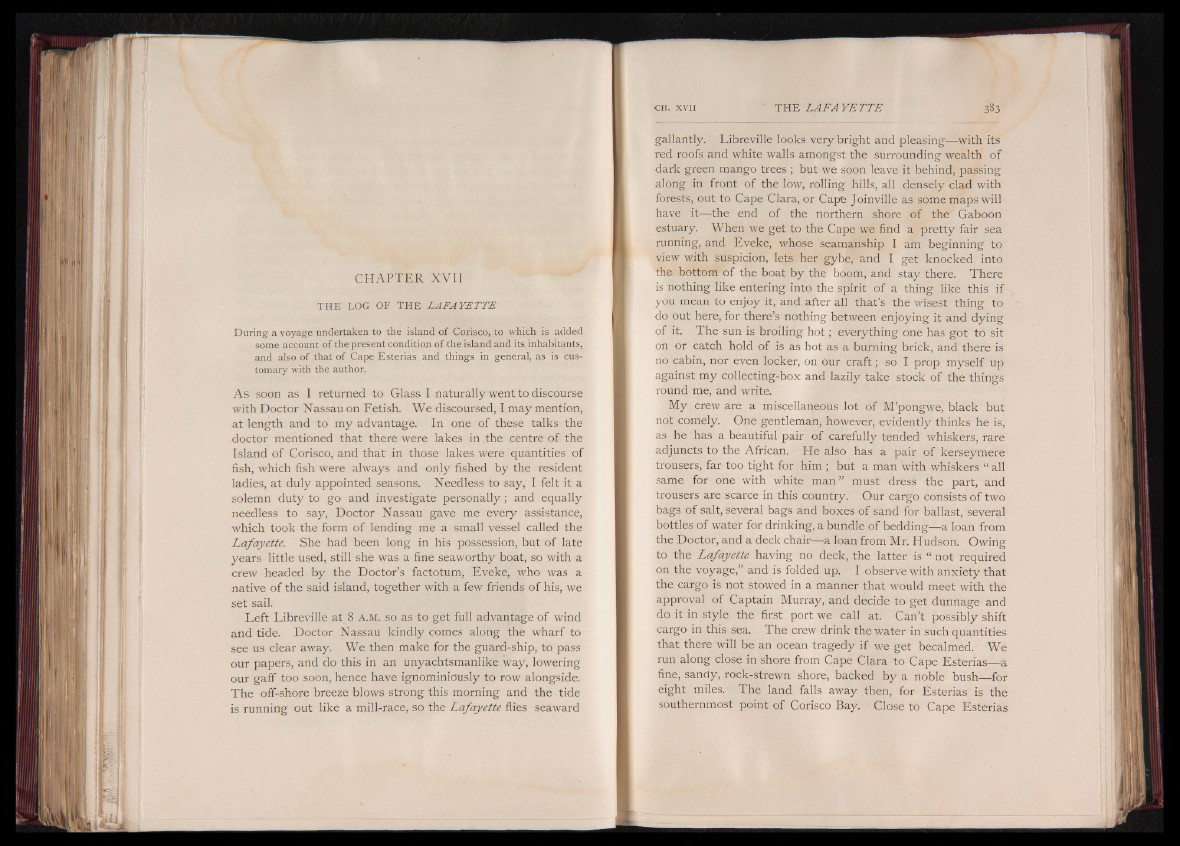
CH AP TER XVII
THE LOG OF THE LAFAYETTE
During a voyage undertaken to the island of Corisco, to which is added
some account of the present condition of the island and its inhabitants,
and also of that of Cape Esterias and things in general, as is customary
with the author.
As soon as I returned to Glass I naturally went to discourse
with Doctor Nassau on Fetish. We discoursed, I may mention,
at length and to my advantage. In one of these talks the
doctor mentioned that there were lakes in the centre of the
Island of Corisco, and that in those lakes were quantities of
fish, which fish were always and only fished by the resident
ladies, at duly appointed seasons. Needless to say, I felt it a
solemn duty to go and investigate personally; and equally
needless to say, Doctor Nassau gave me every assistance,
which took the form of lending me a small vessel called the
Lafayette. She had been long in his possession, but of late
years little used, still she was a fine seaworthy boat, so with a
crew headed by the Doctor’s factotum, Eveke, who was a
native of the said island, together with a few friends of his, we
set sail.
Left Libreville at 8 A.M. so as to get full advantage of wind
and tide. Doctor Nassau kindly comes along the wharf to
see us clear away. We then make for the guard-ship, to pass
our papers, and do this in an unyachtsmanlike way, lowering
our gaff too soon, hence have ignominidusly to row alongside.
The off-shore breeze blows strong this morning and the tide
is running out like a mill-race, so the Lafayette flies seaward
gallantly. Libreville looks very bright and pleasing—¿with its
red roofs and white walls amongst the surrounding wealth of
dark green mango trees ; but we soon leave it behind, passing
along in front of the low, rolling hills, all densely clad with
forests, out to Cape Clara, or Capfe Joinville as some maps will
have it— the end of the northern shore of the Gaboon
estuary. When we get to the Cape we find a pretty fair sea
running, and Eveke, whose seamanship I am beginning to
view with suspicion, lets her gybe, and I get knocked into
the bottom of the boat by the boom, and stay there. There
is nothing like entering into the spirit of a thing like this if
you mean to enjoy it, and after all that’s the wisest thing to
do out here, for there’s nothing between enjoying it and dying
of it. The sun is broiling hot; everything one has got to sit
on or catch hold of is as hot as a burning brick, and there is
no cabin, nor even locker, on our craft; so I prop myself up
against my collecting-box and lazily take stock of the things
round me, and write.
My crew are a miscellaneous lot of M’pongwe, black but
not comely. One gentleman, however, evidently thinks he is,
as he has a beautiful pair of carefully tended whiskers, rare
adjuncts to the African. He also has a pair of kerseymere
trousers, far too tight for him ; but a man with whiskers “ all
same for one with white man” must dress the part, and
trousers are scarce in this country. Our cargo consists of two
bags of salt, several bags and boxes of sand for ballast, several
bottles of water for drinking, a bundle of bedding— a loan from
the Doctor, and a deck chair— a loan from Mr. Hudson. Owing
to the Lafayette having no deck, the latter is “ not required
on the voyage,” and is folded up. I observe with anxiety that
the cargo is not stowed in a manner that would meet with the
approval of Captain Murray, and decide to get dunnage and
do it in style the first port we call at. Can’t possibly shift
cargo in this sea. The crew drink the water in such quantities
that there will be an ocean tragedy if we get becalmed. We
run along dose in shore from Cape Clara to Cape Esterias— a
fine, sandy, rock-strewn shore, backed by a noble bush— for
eight miles. The land falls away then, for Esterias is the
southernmost point of Corisco Bay. Close to Cape Esterias